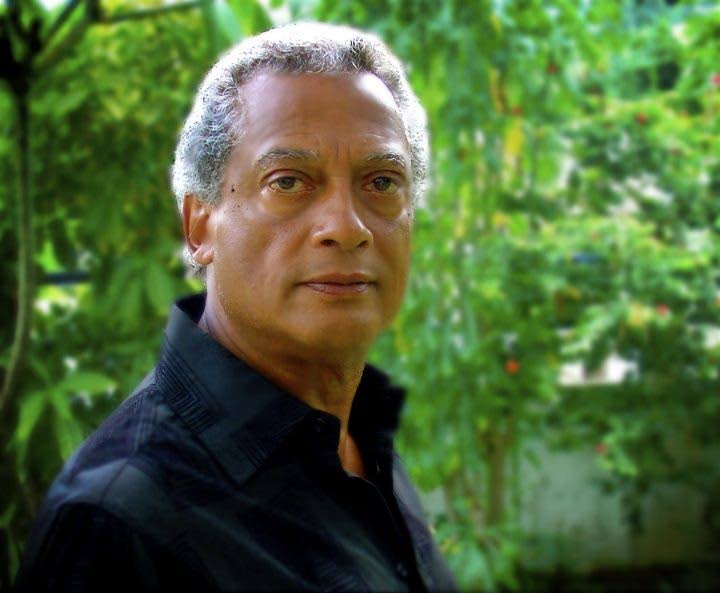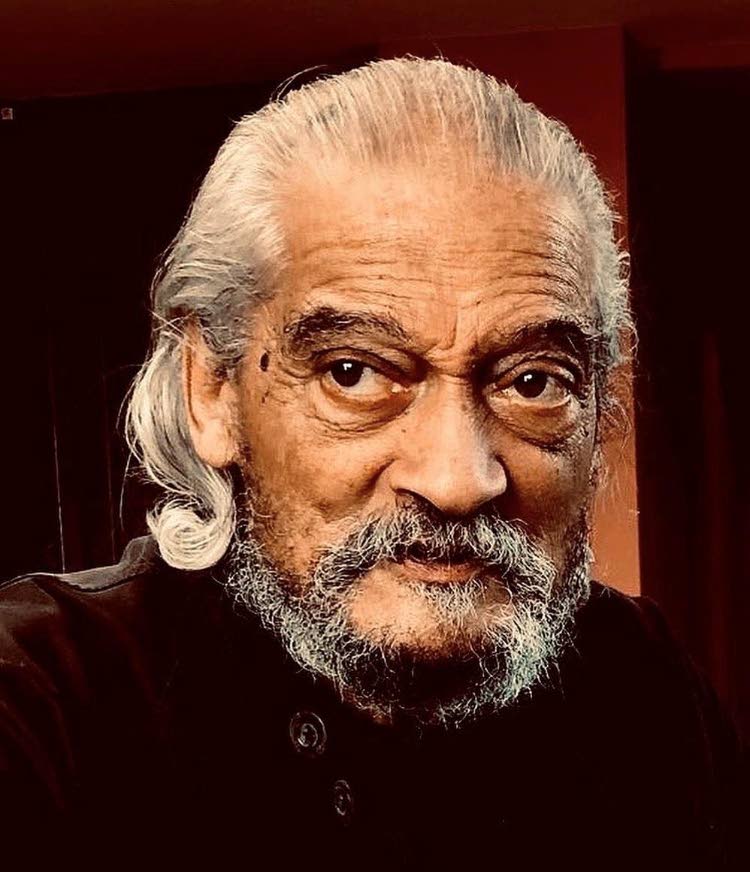[UPDATED] Tributes for pioneering filmmaker Horace Ové

Pioneering filmmaker Horace Shango Ové, known as the godfather of black British filmmaking, died on Saturday at 86.
His son Zak, on his Facebook page, said, "Our loving father Horace took his last breath at 4.30 this morning, while sleeping peacefully. I hope his spirit is free now after many years of suffering with Alzheimer’s. You are forever missed, and forever loved. Rest in Peace Pops, and thank you for everything."
Ové was born in Belmont on December 3, 1936, and was exposed to films from South America, Europe and Hollywood at the over 100 cinemas in Trinidad as he grew up. His website said these films were Ové’s first view of the world at large and the initial catalyst for his journey to becoming a filmmaker.
He migrated to the UK in 1960 to study interior design, and worked at various odd jobs, including as a porter in a local hospital, and on a fishing trawler in the North Sea. He also worked as an extra on films extra including the 1963 Elizabeth Taylor film Cleopatra, which gave him his first real experience of the film world.
“As luck would have it, the entire production was taken to Rome including all the background extras to complete filming. Rome at that time had a thriving film industry producing everything from B Westerns to melodramas and Neo-realist cinema. Feeling a kinship with the more open culture that reminded him of home, Ové remained in Rome after Cleopatra had finished filming.
“He earned a living as a painter and photographer. He often was at Cinecitta studios, and was inspired by directors like Fellini and Antonioni to go to film school. As he did not speak fluent Italian, he returned to London and in 1965 attended The London School of Film Technique, now the London International Film School,” according to his website.
The TT National Archives said Ové began his film career by directing short films and documentaries that focused on West Indian immigrant life in Britain. The first short film he directed was The Art of the Needle in 1966, followed by Baldwin in London (1969). His first documentary film, Reggae (1970), was shown on British television as the first in-depth film on reggae, followed by King Carnival (1973). In 1976, he directed his most popular film, Pressure, which was co-written by fellow Trinidadian Sam Selvon. In 1978, Skateboard Kings chronicled the birth of the new sport.
“Pressure was the first black feature-length drama that highlighted the experiences of the Windrush generation in London, earning Ové a Guinness World Record. The film was initially banned because of its depiction of police brutality, but was eventually released to wide acclaim.”
Ové’s early photographic work captured the Black Power movement and counter-culture in London. He captured images of Michael X, Stokely Carmichael, Darcus Howe, John Lennon, Yoko Ono, and other leading figures in the Caribbean Artists Movement.

Ové stated about his works, “I wanted to show that black people were fighting for their rights under a very racist situation and...were finding ways and means of demonstrating their feelings."
Ové was recognised for his work many times, including Best Director in 1986 by the British Film Institute, a Humming Bird Medal from the TT government in 1992, the Commander of the Order of the British Empire in the Queen's Birthday Honours List for his services to the film industry in 2007, as a film pioneer by the TT Film Festival in 2012, as a national icon by the TT government in 2013, in 2018 the Special Jury Prize at the British Independent Film Awards, and knighthood in the Queen's New Year Honours List in 2022.
On receipt of his knighthood, Ové said in a statement to the PA news agency, “I’m greatly honoured to receive this recognition for my work.
“Chronicling the lives, battles, art and culture of the African and Caribbean diaspora in Britain and around the world has been a lifelong journey and passion. This award is testament to how far we have come and, in many respects, how far we still have to go. One love.”
Foreign and Caricom Affairs Minister Dr Amery Browne in a WhatsApp message said:“It is with a great sense of sadness that I received the news of the passing of Sir Horace Ové the TT-born iconic filmmaker and photographer.
“Sir Horace Ové was honoured at the 2021 TT Film Festival when it hosted a retrospective of his films including Playing Away, and King Carnival, Ové's love letter to Trinidad Carnival. In 2022 Sir Horace received knighthood in the Queen's New Year Honours List.
“On behalf of the Government and people of TT I extend my sincere condolences to the family and friends of Sir Horace Ové. May his soul rest in peace.”
Filmmakers in TT paid tribute to Ové, acknowledging his influence on their work and Caribbean cinema.
Yao Ramesar, who thought of Ové as a mentor, said, “Farewell to our beloved father-in-cinema, the legendary Sir Horace Ové, CBE. Deepest sympathies to Zak, Kaz, Indra, Ezana & the whole family.
“I wouldn't have been the filmmaker that I am without the guidance of this great man, my compass and an inspiration to so many. He was the father of black British/West Indian cinema. His indispensable guidance to emerging filmmakers and the succour of his films, photographs and art will remain a balm and an inspiration for the generations to come. Forever grateful for all your gifts, roll-in-power maestro, direct the angels now.”
Activist Attillah Springer, on her Facebook page, paid tribute to Ove, calling him “such a quintessential Belmont man. His camera was his bois. He took the energy of those early days wandering those narrow streets and secret lanes and put them into films that saw us, that made us the stars.
“I give thanks for all the chances I got to see him at work and at play, to be in the audience to watch new generations discover his work. Walk good, Horace, may your next life be a never-ending supply of film and subjects for stories, an endless Belmont of undiscovered lanes, a sky full of black stars.”
Filmmaker Danielle Dieffenthaller said Ové had made his mark and the film industry was grateful to him.
Filmmaker and festival director of Africa Film TT Asha Lovelace said, “We will be forever grateful for Horace Ové’s contribution to the world of cinema. I have no doubt that Caribbean filmmakers will continue to be inspired by the potency and courage in his filmmaking.”
Journalist and writer Wesley Gibbings said, “Horace Ové kept a Caribbean flag flying high in a space that demanded nothing short of creative excellence to command universal attention. It was his contribution to our collective freedom cry. Thank you, sir.”
The British Film Institute, which funded the film Pressure, and had scheduled a retrospective of his work titled “Power to the People: Horace Ové’s Radical Vision” for September 17-30, also paid tribute to Ové on social media.
“We're deeply saddened to hear of the passing of Sir Horace Ové. Photographer, painter, writer, and pioneering filmmaker, Ové's career spanned four decades and encompassed cutting-edge drama and documentary. He worked outside of the system, showing generations of black filmmakers that it could be done, and that their voices have power. Our thoughts are with his friends and family at this time.”
The Windrush Caribbean Film Festival thanked Ové for paving the way for black British cinema.
“You have done more than most to set the bar for how we should tell our stories. And though I have never met you, your spirit lives on through so many other people that continue to have an influence on my life including the late Menelik Shabazz.
“I have no doubt that your legacy will continue to live on through your children and through all other black British creatives who have heeded the call since you became the first black British director to release a film theatrically in 1976. The fact that Pressure will be re-released later this year is bittersweet as you won’t be here to experience it. Alas, your work on Earth has been done. May the Lord bless you and may the Lord keep you. RIP Sir Horace Ove.”
This story was originally published with the title "Filmmaker Horace Ové dies at 86" and has been adjusted to include additional details. See original post below
Filmmaker Horace Shango Ové died on Saturday at the age of 86.
His son Zak, on his Facebook page, said, "Our loving father Horace took his last breath at 4.30 this morning, while sleeping peacefully. I hope his spirit is free now after many years of suffering with Alzheimer’s. You are forever missed, and forever loved. Rest in Peace Pops, and thank you for everything."
According to the TT National Archives, Ové was born in Belmont on December 3, 1936 to a multi-cultural family of African, Indian, French and Spanish heritages.
He began his film career by directing short films and documentaries that focused on West Indian immigrant life in Britain. His first documentary film Reggae (1970) was shown on British television as the first in-depth film on reggae, followed by King Carnival (1973). In 1976, he directed his most popular film Pressure which was co-written by fellow Trinidadian author Sam Selvon.
Ové received a number of awards, including TT's Hummingbird medal in 1992, and the title of Best Director in 1986 from the British Film Institute.
In 2012, the TT Film Festival (TTFF) honoured him as a film pioneer and in 2013 he was named a national icon by the Trinidad and Tobago government.
In 2022, Ové was knighted during the UK New Year's Honours for his contributions to British cinema and media.

Comments
"[UPDATED] Tributes for pioneering filmmaker Horace Ové"